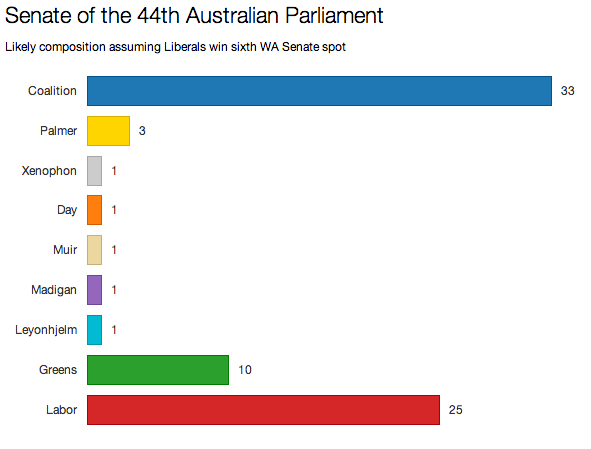As Opposition Leader, Tony Abbott frequently railed against the Gillard Government’s minority status. Cobbled together with the support of the Greens and country independents, Julia Gillard’s shaky majority on the floor of the lower house was regularly attacked by the Coalition as evidence for the illegitimacy of her government.
It’s all the more ironic, therefore, that now that he finds himself in office, Tony Abbott is beholden to a motley crew of Senate minor parties.
With the Liberal Party’s Linda Reynolds favoured to win the final Senate seat in the west, the Coalition will most likely control 33 seats in the upper house after 1 July. It needs 39 to pass legislation. This means it has to find another six votes from the cross-benches.

After Saturday’s vote, four of these will be controlled by Clive Palmer: three Palmer United Party senators, plus the unlikely Ricky Muir of the Motoring Enthusiasts’ Party. Also in the mix are veteran South Australian independent Nick Xenophon, Victorian DLP Senator John Madigan, Liberal Democrat David Leyonhjelm and Family First’s Bob Day.
The Greens themselves represent enough votes to pass government legislation. This is an ideologically unlikely combination, but one that might come into play when it comes to Abbott’s paid parental leave scheme.
The Senate arithmetic poses some interesting challenges for the Coalition, particularly Tony Abbott’s point man in the upper house, Eric Abetz. Neither are famed for their skill in negotiation. Abbott tried and failed to round up support from lower house independents in 2010; the bungled discussions cost the Coalition government.
Nor is Eric Abetz well known for his conciliatory style. The hardline Tasmanian is more comfortable delivering stinging attacks than rounding up reluctant cross-bench support. By contrast, veterans like Nick Xenophon are well used to wheeling and dealing to secure concessions for special interests they favour.
Not only will the Coalition need to negotiate on each and every bill to pass the Senate, the numbers also give Labor, the Greens and the Palmer United Party plenty of opportunity to exert scrutiny on controversial government policies, through Senate estimates and committees.
Palmer’s position, controlling the largest bloc of right-wing cross bench votes, is a nightmare scenario for the Abbott government. The wily Queenslander is every bit the political populist that Abbott is. He’s not too bad in front of a camera either. Palmer has shown himself willing and able to use his numbers to extract concessions from a government that will need to his support for most of its legislative agenda. That potentially makes Palmer every bit as influential in the Abbott government as Christine Milne and the country independents were in Julia Gillard’s.
On some bills, the government can be expected to win support fairly easily. Repealing the mining and carbon taxes are entirely to the liking of a mining billionaire, after all. Other legislation could well prove controversial. Surprisingly, the Renewable Energy Target could become an issue, because of the wind and solar industry activity it is supporting in rural communities. Palmer can also be expected to act unpredictably. He will find it much easier to extract concessions from the government if he can’t be counted on as a safe voting bloc.
Indeed, Palmer has already shown he is prepared to rock the boat on renewables policy. During the Western Australian campaign, newly elected PUP Senator Dio (Zhenya) Wang issued a press release defending the Renewable Energy Target and arguing for its retention as a tool to support greenhouse gas reduction. The statement understandably attracted considerable interest from the energy industry.
Palmer is not the Coalition’s only worry, though. Even if PUP support is secured, the government will still need two extra votes to pass laws. This puts Nick Xenophon in a very handy position. As the most experienced independent in the Senate, Xenophon has the best knowledge of Senate processes. A seasoned Senate operator, he’s no mean populist and media performer himself.
Xenophon is also generally thought to be able to bring Madigan’s vote with him. If he can attract Leyonhjelm or Day, Xenophon will control a bloc of three that will be nearly as influential as Palmer’s. Xenophon can be expected to lobby hard on issues that play well to his South Australian electorate, like Murray Darling water reform.
On the other side of the chamber, Labor and the Greens together control 35 seats. This means they will need just three extra votes to block government legislation, as 38 votes is enough to defeat Senate bills. With a diverse assortment of cross-benchers, such a configuration is by no means impossible. A coalition of Labor, the Greens and Palmer United Party could frustrate the Abbott government’s entire legislative agenda. That’s a sobering thought for the Coalition brains trust.
Donate To New Matilda
New Matilda is a small, independent media outlet. We survive through reader contributions, and never losing a lawsuit. If you got something from this article, giving something back helps us to continue speaking truth to power. Every little bit counts.



